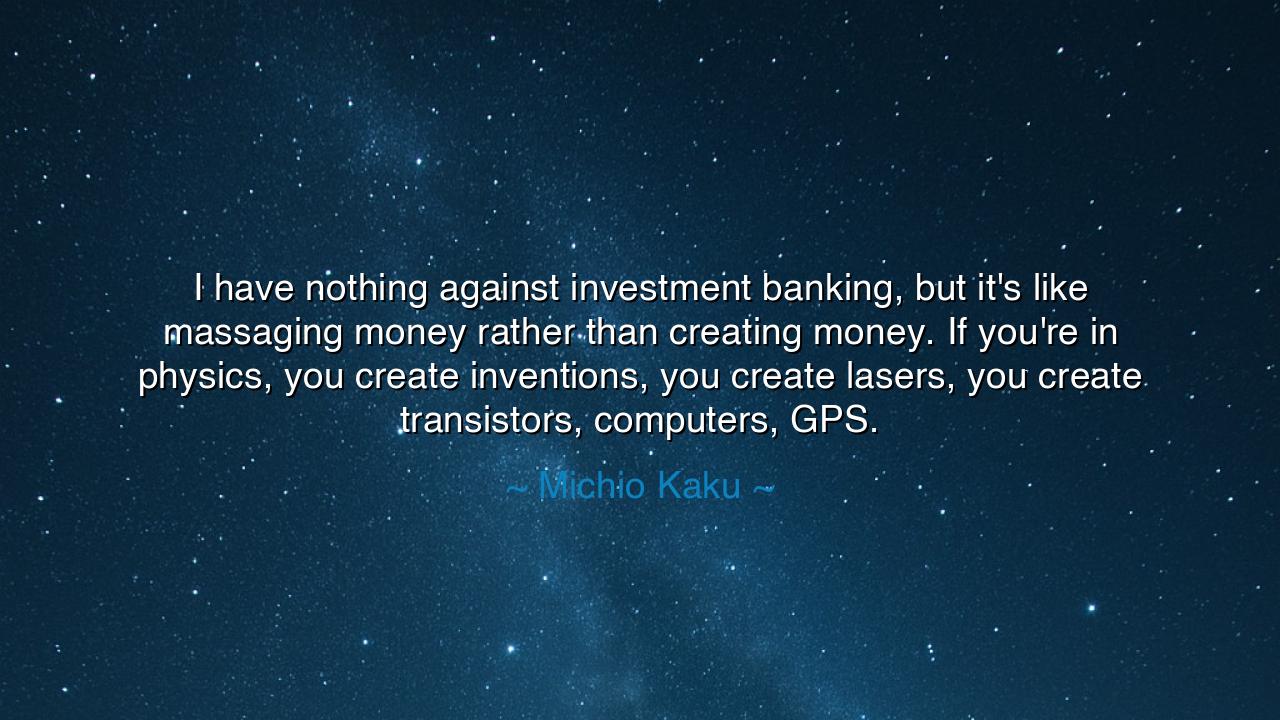
I have nothing against investment banking, but it's like
I have nothing against investment banking, but it's like massaging money rather than creating money. If you're in physics, you create inventions, you create lasers, you create transistors, computers, GPS.






"I have nothing against investment banking, but it's like massaging money rather than creating money. If you're in physics, you create inventions, you create lasers, you create transistors, computers, GPS." These words spoken by Michio Kaku carry a sharp critique of the world of finance, juxtaposing it with the creative and innovative realm of science and technology. Kaku emphasizes that while investment banking may manage and redistribute wealth, it does not inherently create new value in the same way that scientific discovery or technological advancement can. He places science on a pedestal, valuing its potential to transform the world through inventions and discoveries that fundamentally change the way we live, rather than simply shuffling existing resources.
In the ancient world, the philosophers and thinkers of the time sought not merely to understand the world as it was but to transform it through the application of knowledge. Archimedes, for example, made breakthroughs in mathematics and engineering, not just by theorizing, but by creating practical applications that changed the way people interacted with the world. His inventions, such as the Archimedean screw, revolutionized water irrigation. In the same way, Kaku’s distinction between massaging money and creating inventions underscores the enduring value of creation—the ability to use one’s knowledge to generate something new and tangible that can alter the course of history.
Consider the work of Galileo Galilei, the Italian astronomer who, in the 16th century, revolutionized our understanding of the universe with the invention of the telescope. Galileo didn’t merely manipulate existing ideas; he created tools and theories that allowed humanity to see the world in a completely new light. This act of creation is what Kaku refers to when he speaks of physics—not just about understanding what already exists, but about innovating and building something that has never been seen before. Galileo’s telescope became a symbol of human potential to reach beyond the known and explore the unknown. Just as Galileo changed our view of the cosmos, so too do scientists today continue to shape our world through groundbreaking discoveries and technological advances.
In modern times, the world of investment banking is often seen as focused on the management of wealth rather than the creation of it. While financiers may bring capital to existing industries or redistribute wealth, they do not, as Kaku points out, create new inventions that alter the way people live or interact with the world. The tech industry, however, is full of examples of scientists and engineers who have changed society by inventing the tools that define the modern age—computers, the internet, smartphones, and artificial intelligence. These are not just new ways of managing money; they are revolutionary advances that have reshaped culture, communication, and commerce.
The lesson in Kaku's words is one of purpose and vision. It reminds us that the true power of human creativity lies not in the ability to preserve or redistribute wealth, but in the ability to create something that transforms lives. The greatest achievements in history—whether they be in science, art, or engineering—are the result of people who saw the world not as it was, but as it could be. They didn’t just manage the status quo; they pushed the boundaries of what was possible, often challenging existing paradigms and shaping a future that generations to come would inherit.
In practical terms, Kaku’s critique urges us to focus on creation rather than preservation. If we wish to leave a meaningful legacy, we should ask ourselves whether we are creating something that will stand the test of time—whether through invention, art, or ideas. Whether in the field of technology, medicine, or art, our true potential lies in the ability to innovate and transform the world around us. To focus solely on managing or distributing what has already been created is to limit our own creative potential and fail to realize the full power of human ingenuity.
Let us take inspiration from the ancients and from those today who are creating the future—whether through the advancements of artificial intelligence, the development of renewable energy, or the exploration of space. The call is clear: don’t simply manage the world as it is; create the world that could be. Through science, technology, and imagination, we hold the power to build a future that is not only different but better.






AAdministratorAdministrator
Welcome, honored guests. Please leave a comment, we will respond soon